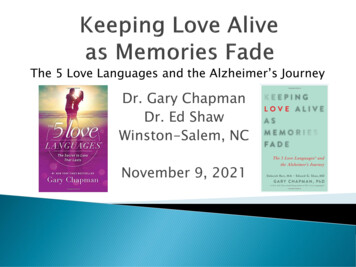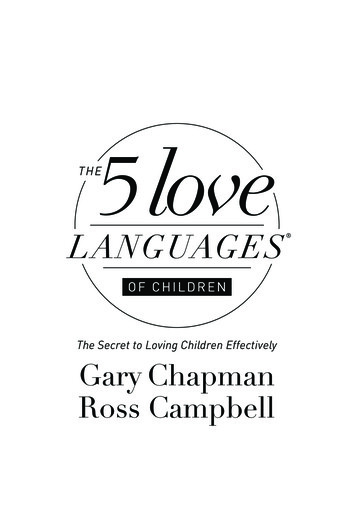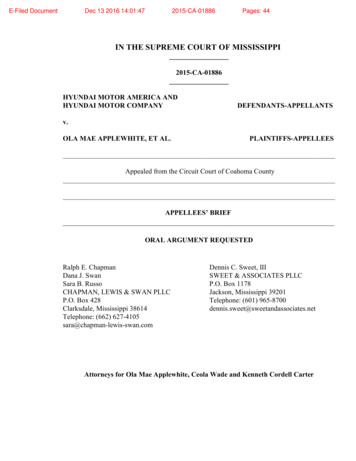
Transcription
The 5 Love Languages and the Alzheimer’s JourneyDr. Gary ChapmanDr. Ed ShawWinston-Salem, NCNovember 9, 2021
The neuropsychiatric symptoms (NPS) of dementia
ApathyLack of insight, impaired judgment, and denialChanges in emotional expression – emotionalwithdrawal/isolation, loss of empathyChanges in mood – depression (irritability),anxiety, obsessive/compulsive behaviors,hoardingRepetitive questions, vocalizations, and behaviorsLost identityDelusions involving money, fidelity, harmBehavioral disinhibition – rudeness, sociallyinappropriate comments/behaviors, crying orlaughing spells, excessive sweets
AgitationAggressionVisual and auditory hallucinations and visualmisperceptionsWanderingSexual behaviorsResisting careSundowningDay-night reversalUrinary and fecal incontinence
SymptomMCI-Early AD (%)Middle-Late AD n1540Sleep/Eating Disturbance1831Apathy1845Depression2644 1 of the above5080*modified from Lyketsos et al, JAMA 2002
What happened?Take Rebecca’s perspective she felt unattached toher “peeps” and her surroundings!
In (large) part, because they experienceattachment loss and separation distress which affects their ability to expressemotional love which in turnaffects their relationships
It’s how we come tolike or love another, to experiencethe joy of being together (attachmentbonds), and avoid the dislikeof being apart (separation distress)
Says our very firstattachment is usually toour mother with whomwe seek: Nourishment Comfort Safety Security
Securely attached children: Interact with strangers anddon’t do not feel threatened Separate from parents without feeling anxious Explore new situations without being fearful Confident with positive self-esteem Socially connected form numerous long-lastingattachment bonds throughout life (parents,siblings, family, friends, coworkers,spouse/partner, and own children our “peeps”)
Insecurely attached children: Feel threatened by strangers Anxious and/or angry whenseparated from parents Fearful in new situations Lack confidence andself-esteem Socially isolated weak attachment bondswith their “peeps”
The child exhibits the behaviors of separationdistress CryingClingingCalling outLashing out because she feels abandoned and is seeking* hermother out to reattach to her.*brain dopamine levels increase when the seeking system is activated
A lot! Because of memory and cognitive loss, someseniors as well as people with living dementia areprone to feeling unattached from loved ones, leadingto separation distress and seeking behaviors.
Withdrawn Response g Response ngRepetitive or distressingvocalizations(“I want to go home” or“Help me, help, help!”)
Family care partnersand healthcareprofessionals tend toreact to the“separation distress”by physically andemotionallydistancingthemselves* from theperson withdementia, oppositeof what they need!Or meds are used: Antipsychotics(dopamineblocking drugs) Anti-anxietydrugs(benzodiazepines) Anticonvulsants(moodstabilizers) Antidepressants(SSRI, SNRI,others)
Physical Touch Hold hands and take a walk Give a hug and a kiss Sit close or hold them Rub their feet or back, gently stroke theircheek Apply lotion to their hands Let them hold a baby, dog or cat, or doll Give them a mani-pedi and paint their nails Dance with them
Words of Affirmation Tell them “I Love You” Answer each repeated question as if it were beingasked for the first time Talk to them (even if they can’t talk about about any topic that’s been important to them) Tell them they look beautiful or handsome Help them write a card or letter and sign it Sing them to sleep Tell them you’ve taken care of everything Tell them you are proud of them and their life Brag about them to others while they’re present
Quality Time Read to them, or have them read to you (or agrandchild) Reminisce about old times (while looking atfamily photo album or movie) or important eventsin history Watch a favorite movie Go for a ride in the car Bake some cookies together Laugh together Color or paint with them, or do a puzzle together Tell stories
Acts of Service Look at them in the eye when they speak to youand you speak to them Include them in the conversation even if they’renot participating in it Don’t talk about them as if they’re not present Let them help you in the kitchen, around thehouse, or in whatever they want to contribute (dowith not for) Help them groom (makeup, shave, comb/brushhair, pick out clothes, get dressed) Advocate for them
Receiving Gifts Give them a piece of candy, ice cream,cookie, cake, or whatever they love Give them a surprise package to open Send or give them a card, open it with themand read it out loud Give them an iPod loaded with music fromtheir teen and young adult years Be generous with the gift of your time
https://www.youtube.com/watch?v Hlm0Qd4mP-I
Acknowledge, Affirm, and RedirectI don’tknow, I’venever seenhim before.Who wasthat manthat justwalked by?Why, he’s aperfectstranger.It sureseemed likehe knew youto me.WHY, OFCOURSE I’MNOT, HOWDARE YOU!YOU’RESLEEPINGWITH HIM,AREN’T YOU?
Easier said than doneHe’s not responding this way on purposeStay calm and keep the drama level downDon’t take it personallyThe battle (and the victory) is in your mindAcknowledge what happened rather than ignoring itAffirm your love, confirm your relationship,reinforce your attachment to them using the 5 lovelanguages help them feel loved, safe, and secureRedirect their attentionYou can only do the best you can do and not better(you’re only human) you’ll do better next time!
Available at amazon.comE-mail: drshaw@empatheducation.com
Nov 09, 2021 · Dr. Gary Chapman Dr. Ed Shaw Winston-Salem, NC November










